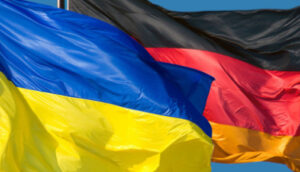
Germany will provide Ukraine with an additional 200m euros to support education, the health care system and drinking water supply, as well as reconstruction of cities.
This was announced by the German government’s commissioner for Ukraine’s reconstruction, Jochen Flasbart, during his visit to Ukraine, Deutsche Welle (Deutsche Welle) reported citing DPA.
According to the Ministry of Economic Cooperation and Development in Berlin, Germany has allocated about 1.1 billion euros to support civilians since Russia’s full-scale invasion of Ukraine.
On October 20, Flasbart announced on social network X that he had arrived in Kiev together with German Federal Minister for the Environment Steffi Lemke.
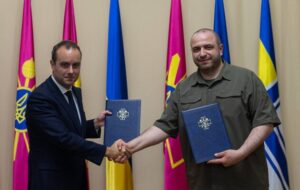
Defense Ministers of Ukraine Rustem Umerov and France’s Sébastien Lecorne discussed the supply of weapons and military equipment, bilateral projects on military-technical cooperation, training of Ukrainian servicemen and the implementation of Euro-Atlantic standards, the press service of the Defense Ministry reports.
“I would like to thank Mr. Minister, the President, the government and the people of the French Republic for their unwavering support for Ukraine in providing a powerful package of military and humanitarian aid, as well as protecting Ukrainians who were forced to flee Ukraine to escape Russian bombing,” the press service quoted Umerov as saying.
It is reported that France has already provided Ukraine with modern SAMP/T and Crotale air defense systems, CAESAR artillery systems, Milan anti-tank weapons, AMX tanks, VAB armored personnel carriers, etc. According to Umerov, “this assistance certainly brings our victory closer.”
Lecorneu, for his part, emphasized the importance of continuing assistance to Ukraine by partner countries in the long term, focusing on the transfer of weapons and military equipment, training of Ukrainian military personnel and joint defense production.
“The first is the transfer of weapons. We will continue to transfer weapons to Ukraine. The second part of our support is training of soldiers. We have fulfilled our goals by the end of the year. More than seven thousand Ukrainian soldiers were trained in France (on French territory or in Poland). It was either some general training or specialized training. I would like to inform you that the training will continue at the same level. The third issue is more strategic and concerns our ability to jointly produce something for the needs of Ukraine,” the French Defense Minister said.
In addition, during the visit of the Minister of the French Armed Forces to Ukraine, a memorandum of intent on cooperation was signed between the state-owned enterprise of the Ministry of Defense of Ukraine “Defense Procurement Agency” and the Directorate General for Armaments (DGA) (France). The document envisages indefinite cooperation and creates a legal framework for concluding contracts. It will also contribute to deepening military-technical cooperation, in particular in the development of joint high-tech projects for the defense of both countries.
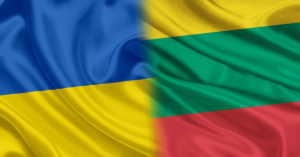
Ukraine and Lithuania intend to resume passenger rail transportation on the Kyiv-Warsaw-Vilnius route, move veterinary and phytosanitary inspections of transit cargo from Ukrainian-Polish border crossings to the port of Klaipeda, and start Ukrainian airlines flying from the country’s airports, Deputy Minister of Community, Territorial and Infrastructure Development Oleksandra Azarkhina wrote on Facebook.
According to her, these issues were discussed at a meeting of the Intergovernmental Ukrainian-Lithuanian Commission on Trade, Economic, Scientific and Technical Cooperation chaired by Deputy Prime Minister for the Reconstruction of Ukraine and Minister of Community Development, Territories and Infrastructure Oleksandr Kubrakov and Minister of Economy and Innovation of the Republic of Lithuania Aushrine Armonaitė.
“Regarding cooperation in the transport sector, we discussed the main directions of restoring and expanding transport links between Ukraine and Lithuania. Namely: the possibility of resuming passenger transportation by rail and further development of the Kyiv-Warsaw-Vilnius route; bilateral cooperation with the involvement of EU institutions to include Yahodyn-Dorogousk in the Trans-European Transport Network; transfer of veterinary and phytosanitary inspections of transit cargo from Ukrainian-Polish border crossings to the port of Klaipeda; development of new routes for the transportation of goods through Poland, which will increase cargo turnover and expand the range of railroad services.
It is noted that, according to the Lithuanian side, the facilitation of procedural requirements at the Ukrainian-Polish border will allow transporting up to 500 thousand tons of Ukrainian agricultural products per year to the port of Klaipeda. Lithuania also plans to install bogie change terminals for railroad tracks, which will also help increase cargo turnover between the two countries.
In addition to the development of railway communication, the Lithuanian side suggested that Ukrainian airlines consider starting operations in Lithuania and participating in national tenders for strategic destinations.
“We have agreed to deepen cooperation in the aviation sector and hope to resume air travel between Lithuania and Ukraine in the near future,” Azarkhina wrote.
Earlier, Lithuania confirmed the need for the EU to subsidize the transportation of Ukrainian grain through Klaipeda.
KYIV, LITHUANIA, passenger rail transportation, UKRAINE, VILNIUS, WARSAW
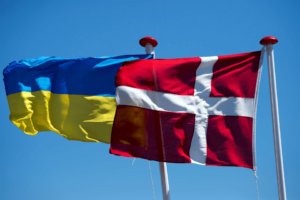
The Danish government proposes to increase aid for Ukraine’s civil needs from DKK 1.2 billion to DKK 1.5 billion next year, the Ministry of Foreign Affairs reports.
“Denmark will increase the scope of assistance for the development of Ukraine, which will again become the largest recipient country of Danish aid. In the Finance Law for 2024, the government proposes to increase from DKK 1.2 billion to DKK 1.5 billion (about $43.5 million) allocated for the civil needs of Ukraine and the countries of the Eastern Neighborhood within the Ukraine Fund of Ukraine,” the Danish Foreign Ministry said in a statement.
Minister for International Development and Global Climate Policy Dan Jørgensen noted that “assistance to Ukraine and the Ukrainian people is a top priority for the government.”
“Therefore, this year we again allocate a record high amount to civilian needs in order to continue to provide important support and help overcome the difficult consequences of the war. Ukraine’s recovery will be long, and the needs are huge,” the minister stressed.
The Ministry of Foreign Affairs indicates that the assistance will be aimed at providing emergency assistance to the victims of the war, as well as restoring the most important infrastructure of Ukraine.
“At the request of Ukraine itself, the government has taken on special responsibility for the city of Mykolaiv and its restoration. In Mykolaiv, Denmark is helping provide better access to water and heat, as well as restoring and repairing residential areas, schools and medical facilities,” the Danish ministry notes.
In addition, Denmark will assist countries such as Georgia and Moldova by accelerating the reforms and large-scale democratization processes they face as the consequences of the Russian invasion extend to neighboring countries with Ukraine, “which are suffering from Russian influence, the reception of Ukrainian refugees and power supply problems.”
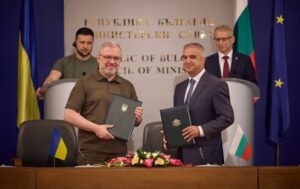
A memorandum of understanding between the Ukrainian and Bulgarian energy ministries on cooperation in the energy sector was signed in the presence of Zelensky and Bulgarian Prime Minister Nikolo Denkov during an official visit of Ukrainian President Volodymyr Zelensky to Bulgaria.
According to the press service of the Ukrainian head of state, the document was signed by Ukrainian Energy Minister Herman Galushchenko and Bulgarian Energy Minister Rumen Radev.
“The memorandum is aimed at creating framework conditions for deepening cooperation in the energy sector of Ukraine and Bulgaria based on the principle of mutual benefit and taking into account common interests and goals of both countries,” the statement said.
Ukraine and Bulgaria undertook to provide affordable energy, as well as to support industrial and regional development, security and prosperity of their peoples, expand cooperation and a shared commitment to protect the environment and mitigate climate change and reduce carbon emissions.
It was noted that taking into account Ukraine’s status as a candidate for EU membership and Bulgaria’s obligations as a EU member state, the sides agreed to intensify further mutually beneficial cooperation in the field of nuclear energy, green energy, hydrogen, as well as energy storage systems and smart grids.
Sharing knowledge and experience to protect energy infrastructure from physical, electromagnetic, and cyber threats is a priority in the cooperation.
As reported, Bulgarian parliamentarians by a majority vote delegated the country’s Energy Minister to negotiate with his Ukrainian counterpart on the possibility of selling equipment intended for Belene NPP to Kiev, Bulgarian National Radio (BNR) reported Thursday.
The decision was supported by 135 deputies, while 57 opposed.
Earlier, BNR reported that Ukraine had expressed interest in purchasing the reactors intended for Belene NPP.
Bulgaria abandoned the project in 2012.
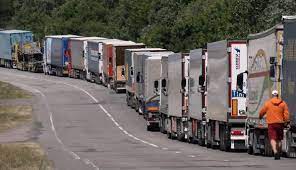
The All-Ukrainian Agricultural Rada (AAR) and the Association of Milk Producers (AMP) will hold a mirror strike in response to the protest started by Polish farmers against the transit of Ukrainian agricultural products through Poland and will not allow Polish trucks into Ukraine.
“In protest against the actions of Polish agricultural producers who began a strike and blocked the border crossing point (BCP) “Dorohusk – Yagodin” for cargo with Ukrainian grain, domestic agricultural producers decided to act in the mirror,” – noted in a press release of the WAR.
It is emphasized that Ukrainian agrarians have taken a strong stance to protect their interests and the domestic agricultural sector. During the strike, they will block the movement of Polish trucks through four international checkpoints, viz: The checkpoint “Dorogusk – Jagodin” on the Ukrainian side, in the municipality of Krakivets near the checkpoint “Krakivets-Korcheva”, in the village of Rata near the checkpoint “Rawa-Russkaya” and in the village of Shehini near the checkpoint “Shehini-Medika”.
The action will begin on June 10 at 10:00 and will last until 00:00, June 14.
As reported, for several days, Polish farmers have been blocking the PP “Dorohusk – Jagodyn” in protest against the influx of Ukrainian grain to the Polish market.
Only vehicles carrying humanitarian aid are allowed to pass. As part of the protest, two trucks with humanitarian aid will pass from Poland to Ukraine per hour, and none from Ukraine to Poland.
According to data for Friday morning, about 320 heavy trucks stood in a nine-hour queue to leave Poland for Ukraine at the Dorohusk border crossing point. According to the Ukrainian side, there were 3,185 trucks registered in the electronic queue to enter Poland.
The Polish protest is expected to last until midnight on Monday.